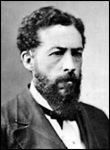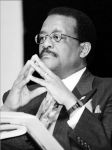Week of October 1-7
October 1
1841—Fannie M. Richards is born. She became one of the nation’s early civil rights advocates as well as a prominent educator.
1868—John Mercer Langston (1829-1897) organizes the nation’s first Black law school at Howard University in Washington, D.C.
 |
|
John Mercer Langston
|
1872—Morgan State College is founded in Maryland.
1937—The NAACP awards the prestigious Spingarn Medal to Walter White for his work against lynchings. The light-complexioned White had “passed for White” to gather evidence against terrorist organizations such as the Ku Klux Klan.
1960—Africa’s most populous nation, Nigeria, declares its independence from colonial rule.
1966—The militant Black Panther Party is founded in Oakland, Calif., by Huey Newton and Bobby Seale.
October 2
1800—Nat Turner is born on this day in South Hampton, Va. The spiritually inspired Turner would organize and carry out one of the deadliest slave revolts in American history. His rebellion led to the deaths of 57 Whites including men, women and children.
 |
|
Johnny Cochran
|
1937—Famed attorney Johnny Cochran is born on this day in Shreveport, La. He was the lead attorney in the 1995 murder trial, which resulted in the not guilty verdict for football legend O.J. Simpson. In addition to Simpson, Cochran was involved in several other high profile cases. He died on March 29, 2005 at the age of 67.
1967—Thurgood Marshall is sworn in as the first Black justice on the United States Supreme Court. President Lyndon Johnson nominated him in part because of his distinguished career in the NAACP fighting to desegregate American institutions. Marshall had been the lead attorney in the historic Brown v. Board of Education case, which led to the desegregation of the nation’s schools.
1986—The U.S. Senate imposes economic sanctions on the then-White minority government in South Africa. The sanctions were imposed only after the Senate overrode a veto of the measure by President Ronald Reagan. Reagan had angered Blacks and progressive Whites by favoring a policy he referred to as “constructive engagement” with the racist South African regime. Black majority rule was not achieved in South Africa until 1994.
October 3
1856—Journalist and fiery advocate for Black rights T. Thomas Fortune is born in Marianna, Jackson County, Fla. He was an orator, journalist and militant civil rights advocate. He attended Howard University in Washington, D.C. but later moved to New York City where he founded the New York Age newspaper. Fortune died in Philadelphia at the age of 71 in 1928.
1935—The then-independent East African nation of Ethiopia is invaded by fascist Italy in an attempt to join other European nations that had used military force to establish colonies in Africa and exploit its economic resources. Blacks throughout the world rallied to Ethiopia’s defense, in part, because the nation was viewed by many as the place on Earth where human life began. The U.S. effort was led by prominent Harlem, N.Y. minister, Adam Clayton Powell Sr.
1949—One of the first Black-owned radio stations in America began broadcasting in Atlanta, Ga. The organizing force behind WERD was businessman J.B. Blayton.
1995—Former professional football great O.J. Simpson is found not guilty of the murders of his ex-wife Nicole and her friend, Ronald Goldman. The trial had been a national sensation. The verdict angered a majority of Whites. Polls showed that better than 80 percent of Whites surveyed felt Simpson got away with murder.
October 4
1864—What was to become the nation’s first Black daily newspaper began publishing on this day in New Orleans, La. Amazingly, the New Orleans Tribune began distribution while slavery still existed. It was founded by Dr. Louis C. Reudanez. It began as a tri-weekly but soon became a daily published in both French and English.
1969—Howard Lee and Charles Evers became the first Black mayors of Chapel Hill, N.C. and Fayette, Miss., respectively. Evers was the brother of civil rights legend Medgar Evers who was murdered by Ku Klux Klan member Byron De La Beckwith on June 12, 1963.
1988—The Martin Luther King Jr. federal building is dedicated in Atlanta, Ga. It became the first federal building to bear the name of the slain civil rights leader.
October 5
1867—The first Black mayor of an American city takes office. His name was Monroe Baker. The prominent businessman was appointed mayor of St. Martin, La., two years after the end of slavery.
October 6
1847—The first National Black Convention takes place in Troy, N.Y. There were more than 100 delegates in attendance from at least nine states. Top items on the agenda included determining ways to help end slavery and encouraging free Blacks to refuse to buy products produced by slave labor. Frederick Douglass frequently makes note of the convention because one of its aims was to organize independent Black power and “not depend on Whites and hope” to free Blacks.
1871—The now world famous Fisk Jubilee Singers begin their first national tour. The tours helped raise funds for Nashville, Tennessee’s predominantly Black Fisk University as well as give the school an international reputation.
1917—Activist Fannie Lou Hamer is born in Montgomery County, Miss. She went on to become one of the major female figures in the Civil Rights Movement of the 1960s. She remained one of the movement’s most effective unsung heroes. As to why she became involved in the movement for Black freedom, dignity and political rights, she would often say in reference to injustice, “I’m sick and tired of being sick and tired.
1971—The first legal interracial marriage takes place in North Carolina. A Black man, John Wilkinson, marries a White woman, Lorraine Mary Turner. The marriage came a few years after the 1967 U.S. Supreme Court ruling in Loving v. Virginia that legal barriers to interracial marriage, which existed in most Southern states, were unconstitutional.
October 7
1821—One of the most prominent Blacks in the Underground Railroad, William Still, is born near Bedford, Mass. The Underground Railroad was the name given to a series of secret trails and safe houses used to help Blacks escape from slavery in the South to freedom in the North.
1897—The founder of the Nation of Islam, Elijah Muhammad, is born Elijah Poole in Sandersville, Ga., one of 13 children. Muhammad would build his religious sect into the largest independent Black separatist organization in America. The group is currently headed by Minister Louis Farrakhan. Muhammad died in February 1975.
1934—Activist, writer and poet Imamu Baraka is born Everett LeRoi Jones in Newark, N.J. Baraka was one of the leading intellectual figures in the Black Power and Black Nationalist movements of the 1960s and early 1970s. A special tribute honoring Baraka’s 75th birthday takes place this month.
1967—Carl Stokes is elected the first Black mayor of a major American city—Cleveland, Ohio. Interestingly, he won by defeating Seth Taft—the grandson of a former United States president—Howard Taft.
1993—Writer Toni Morrison is awarded the Nobel Prize in Literature.
(This Week in Black History is compiled by Robert Taylor. He welcomes comments and additions. You can also have a free edition of his popular “Black History Journal” e-mailed to you by contacting him at TaylorMediaPrime@yahoo.com or by leaving your e-mail address at 202-657-8872.)